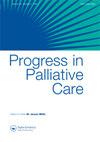丧偶者对临终关怀的满意度
IF 0.8
Q4 PUBLIC, ENVIRONMENTAL & OCCUPATIONAL HEALTH
引用次数: 0
摘要
临终关怀包括为身患绝症的个人及其照顾者提供治疗和支持。有效的沟通和决策、疾病和症状管理、与医生的关系、医疗团队的特点、护理人员的参与和需求都被认为有助于提高临终体验的质量。本研究旨在建立丧失亲人的照顾者的经验质量的要素临终关怀交付给他们的亲人。在过去6 - 12个月期间,在澳大利亚首都地区拥有670张床位的急症护理大学附属医院(N=91),对失去亲人的护理人员(N=91)进行了调查,使用了修改版的加拿大卫生保健评估项目问卷。研究结果表明,丧亲者通常对他们所爱的人的临终关怀非常满意。照顾者的年龄、病人和照顾者的首选死亡地点、是否预期死亡以及宗教信仰与所提供的临终关怀的满意度有关。改善临终关怀的关键领域包括与医生和接受护理者之间的关系、保健团队的特点、疾病管理、沟通和决策以及照顾者的参与有关的因素。这些发现对该医院和那些寻求更广泛地改善临终关怀结果的医院具有重要意义,通过提供护理人员评估的护理质量的基线数据,并确定有针对性干预的高优先级领域。本文章由计算机程序翻译,如有差异,请以英文原文为准。
Bereaved caregivers’ satisfaction with end-of-life care
End-of-life care involves treatment and support offered to terminally ill individuals and their caregivers. Effective communication and decision-making, illness and symptom management, relationship with doctors, characteristics of the health care team, and the involvement and needs of caregivers have all been proposed to contribute to the quality of the end-of-life experience. This study sought to establish bereaved caregivers’ experiences of the quality of the elements of end-of-life care delivered to their loved ones. Bereaved caregivers who had lost a loved one who was cared for in an acute care University-affiliated hospital, with 670 beds, located in the Australian Capital Territory during the previous 6−12 months (N=91), were surveyed using a modified version of the Canadian Health Care Evaluation Project questionnaire. The findings indicated that the bereaved caregivers were generally very satisfied with their loved one’s end-of-life care. The age of the caregiver, the preferred location of death for both patient and caregiver, if death was expected, and religious affiliation were associated with satisfaction of the end-of-life care delivered. Key areas for improvement of end-of-life care included factors related to the relationships between doctors and those receiving care, characteristics of the health care team, illness management, communication and decision-making, and the involvement of caregivers. These findings have significant implications for this hospital and those seeking to improve outcomes in end-of-life care settings more widely, by providing baseline data on caregiver-evaluated care quality and identifying high-priority areas for targeted intervention.
求助全文
通过发布文献求助,成功后即可免费获取论文全文。
去求助
来源期刊

PROGRESS IN PALLIATIVE CARE
PUBLIC, ENVIRONMENTAL & OCCUPATIONAL HEALTH-
CiteScore
2.60
自引率
11.80%
发文量
24
期刊介绍:
Progress in Palliative Care is a peer reviewed, multidisciplinary journal with an international perspective. It provides a central point of reference for all members of the palliative care community: medical consultants, nurses, hospital support teams, home care teams, hospice directors and administrators, pain centre staff, social workers, chaplains, counsellors, information staff, paramedical staff and self-help groups. The emphasis of the journal is on the rapid exchange of information amongst those working in palliative care. Progress in Palliative Care embraces all aspects of the management of the problems of end-stage disease.
 求助内容:
求助内容: 应助结果提醒方式:
应助结果提醒方式:


